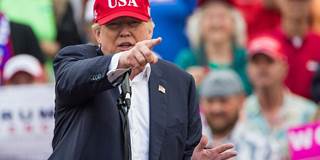With Republicans holding majorities in both houses of Congress, US President-elect Donald Trump should have a relatively clear road ahead to implement his domestic economic agenda. But if Trump is to deliver the high growth he has promised, he will have to overcome external barriers as well.
DUBAI – US President-elect Donald Trump should have a relatively clear road ahead at home for the implementation of his economic program: with Republicans holding majorities in both houses of Congress, he seems likely to benefit from a break in the political gridlock that has paralyzed the body for the last six years. But the United States economy does not exist in a vacuum. If Trump is to succeed in delivering the high growth and genuine financial stability that he has promised, he will need some help from abroad.

DUBAI – US President-elect Donald Trump should have a relatively clear road ahead at home for the implementation of his economic program: with Republicans holding majorities in both houses of Congress, he seems likely to benefit from a break in the political gridlock that has paralyzed the body for the last six years. But the United States economy does not exist in a vacuum. If Trump is to succeed in delivering the high growth and genuine financial stability that he has promised, he will need some help from abroad.